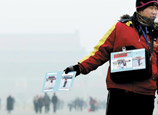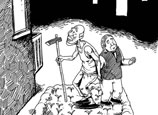
Li Zhihui, general manager of a horticultural company with production bases in Beijing and Shanghai, is worrying whether his business can break even this year.
His company sells to retailers who make deals with individual clients and institutional customers. Retailers placing large orders comprise about 20 percent of Li's clients.
"In the past, our annual sales used to be between 20 million and 30 million yuan ($3.2 million and $4.8 million) and the profit margin was more than 10 percent," Li said. "The best result this year will be to break even."
Zhao Han, a retailer at the Huaxiangqiao Flower Market in Beijing for three years, bought 5,000 pots of flowers after taking an order from a regular client - a State-owned enterprise. But the company canceled the deal, and Zhao lost about 40,000 yuan, the Beijing News reported.
Although Li has been seriously hit this year, he said he has not given much thought to a business transformation.
"It's very difficult for an agricultural enterprise to fulfill a transformation, as it usually takes four to five years to develop it to a certain scale," said Li, who has been working in the field for more than a decade.
He put sluggish demand this year down to the new regulations as well as the economic downturn.
Many florists are considering switching to other jobs, the Beijing News reported.

















 China uses PM 2.5 in weather alert system
China uses PM 2.5 in weather alert system


![]()
